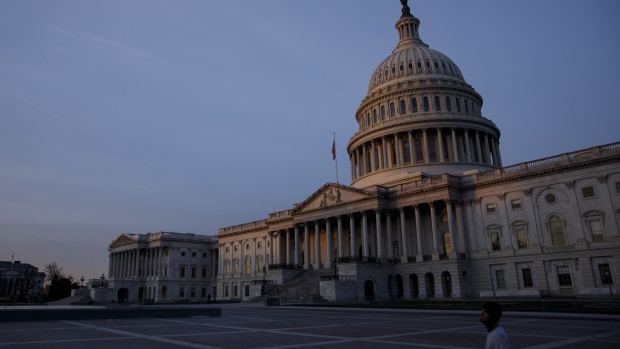Apr 17, 2024
TikTok Divest-or-Ban Bill Moving on Fast Track Through Congress
, Bloomberg News

(Bloomberg) -- TikTok is heading to its moment of truth in Washington, with Congress on a fast track to approve a bill aimed at forcing the social-media platform’s Chinese parent ByteDance Ltd. to divest its controversial ownership stake.
Speaker Mike Johnson plans to include TikTok divestiture legislation already passed by the House in a fast-moving aid package for Ukraine and Israel that the chamber is set to clear on Saturday. The Senate is expected to quickly take up the measure, and President Joe Biden promised Wednesday to sign it immediately.
If signed into law, the bill would deliver a significant blow to a video-sharing app used by as many as 170 million Americans. Its enactment would also mark a major setback to the company’s intense lobbying efforts, especially by Chief Executive Officer Shou Chew, who made the rounds on Capitol Hill last month in a bid to get the Senate to squelch the legislation.
Shares of Snap Inc., a key TikTok competitor, jumped 4.7% on Wednesday.
TikTok, in a post on X Wednesday night, said “It is unfortunate that the House of Representatives is using the cover of important foreign and humanitarian assistance to once again jam through a ban bill that would trample the free speech rights of 170 million Americans, devastate 7 million businesses, and shutter a platform.”
Proponents of the bill claim that China’s government uses TikTok as a propaganda tool and could demand that Beijing-based ByteDance share US users’ data — allegations that the company has previously denied. Its enactment risks provoking a fresh showdown with China, whose leaders came out against a sale when Biden previously pressed ByteDance to divest.
TikTok has previously rejected the argument from some lawmakers that this measure is trying to save the popular app by forcing its Chinese parent company to sell it. TikTok hasn’t publicly entertained the possibility of a divestiture and has said that passing this bill would result in the app being banned in the US.
Even if the bill becomes law, it’s expected to face a wave of legal challenges from TikTok and its supporters. The company intends to exhaust all legal challenges before it considers any kind of divestiture from ByteDance if legislation targeting the app becomes law, according to people familiar with the matter.
The bill gives ByteDance nearly a year to divest itself of the social media platform, with 90 of those days subject to a presidential waiver — longer than the six-month time frame in the original House measure.
That longer deadline is among the changes proposed by Senate Commerce Committee Chair Maria Cantwell of Washington State, who had proposed tweaks to the House bill she said could help ensure it survives a legal challenge. She endorsed the bill late Wednesday.
“Extending the divestment period is necessary to ensure there is enough time for a new buyer to get a deal done,” she said in a statement. “I support this updated legislation.”
The House-passed TikTok legislation has support from data privacy and national security hawks concerned about troves of data on American users potentially being made available to a Chinese company.
Yet a Pew Research Center poll from December showed 38% of Americans support a TikTok ban, down from 50% in March. And Republican calculations became trickier after Donald Trump, the party’s presumptive nominee for this year’s election, came out against a ban that he had supported during his presidency.
Some opponents say the House-passed measure impedes Americans’ right to free speech and risks harming the growing number of entrepreneurs, business owners, and influencers who rely on the app to make a living.
Others, like Cantwell, have expressed concern about court challenges regarding a law singling out one company. Senator Rand Paul, a Kentucky Republican, has predicted it would be struck down.
--With assistance from Erik Wasson, Alex Barinka and Matt Turner.
(Updates with Cantwell quote, in eleventh paragraph.)
©2024 Bloomberg L.P.





